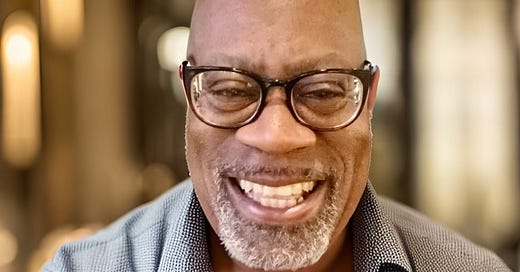Have you ever embarked on a journey with a one-way ticket, not entirely sure where your path will eventually lead? Imagine having a limited budget, no concrete plans for lodging accommodations, and uncertainty about your return trip. That, my friends, is the adventure I find myself on here in vibrant Austin, Texas.
My voyage brought me here to the Texas Book Festival, an event that promises literary excitement and meaningful connections. For the initial leg of my stay, I've been fortunate to find shelter with friends who reside about an hour outside the city. However, as Saturday approaches, I face a peculiar predicament: I'll be navigating the festival with a roller bag in tow, uncertain about my resting place for the night.
You might wonder, "Isn't this predicament stressful?" Surprisingly, it's not, and that's because I've developed an unusual comfort with embracing life's enigmatic twists and turns.
Over the course of our lives, we often find ourselves grappling with the age-old question of how to navigate life’s uncertainties and winding paths. Just like the ancient Taoist wisdom in the chapters preceding, my own experiences have taught me that sometimes, the key to finding our way is to let go of control and embrace the uncertainty that life throws our way.
This weekend, my life is at a crossroads, and my financial constraints have left me uncertain about where I will end up. Yet, in the midst of this struggle, I've come to revisit the profound truth in the teachings of Taoism.
An ancient Chinese philosophy, Taoism emphasizes the importance of moderation and letting go of our own ideas in order to live in harmony with the Tao, within the natural order of the universe. In my own journey, I have found parallels between these teachings and the self-cited challenges I face, particularly when it comes to financial stability.
Moderation, as advocated by Taoism, is often easier said than done. But how can we recognize a moderate person when we see one? The wisdom of the Tao tells us that "the mark of a moderate man is freedom from his own ideas." This statement carries deep significance, especially when we are navigating through uncertainty.
In having faced plenty of unclear paths, I've realized that ideas we cultivate in our head about how to transcend uncertainty, particularly as it relates to a financial situation can be limiting. We often have preconceived notions about how much money we need, what our aims should be, and how to achieve them. Yet these ideas can lead to a rigid mindset that hinders our ability to adapt and find new opportunities.
In contrast, true freedom from ideas is akin to the natural harmony found in nature. Just as the wind blows without a predetermined plan or the rain falls without bias, freedom from ideas allows for open, empty possibilities. It means letting go of rigid plans and embracing the unpredictability of life's often unclear journey.
This journey toward relinquishing our need to control a particular scenario doesn't imply that we should be careless or irresponsible. Instead, it encourages us to be open to unexpected opportunities and to release our fixed plans.
For as the Tao teaches, "A good traveler has no fixed plans and is not intent upon arriving."
This mindset shift has the power to open doors we might have otherwise missed.
Given my financial constraints, my mind is naturally inclined to drift towards a specific destination and a rigid plan on how to get there. However, I find that as I let go of these preconceived notions and embraced the uncertainty of my situation, I discover new ways of allowing solutions to naturally unfold.
Letting go of fixed plans allows us to harness the power of the Tao and use it to our advantage. By opening ourselves to insight, we become one with it, and suddenly, nothing seems impossible.
I've learned that when we stop imposing our will and release our rigid ideas, we can make better use of everything that life brings our way. This is very much in line with the Master, as described in the Tao Te Ching, who "has no destination in view and makes use of anything life happens to bring his way," all with the consequence of "nothing being impossible for him."
Another profound shift that occurs when we release our grip on our own ideas is the capacity for compassion. A mind filled with its own concerns leaves little room for empathy and understanding towards others. However, by letting go of our mental preoccupations, we create space for compassion to flourish. In other words, compassion, in essence, cannot be crammed into a mind brimming with self-centered ideas.
In summary, the teachings of the Tao have shown me that to find harmony in uncertainty and struggles, we must stop trying to control, let go of our own ideas, and make room for compassion. This mindset shift allows us to dwell in harmony with the unpredictable aspects of life, while using every experience as an opportunity for growth and learning.
As I face the uncertainty of where I will end up after this weekend, I find solace in the wisdom of the Tao. Just as the Tao teaches us to be like the forces of nature, I strive to be like the wind, the rain, and the sunlight, embracing the uncertainty of my journey with open arms. I have learned that in letting go, I am truly free to navigate life's challenges, finding harmony and hope even in the midst of uncertainty.
The Chocolate Taoist is a reader-supported publication. To receive new posts and support my book publishing journey, please consider becoming a member supporter at $6.00/month or $60.00/year.





Uncertainty is, without question, my favorite topic—and as someone who knows nothing about Taoism, it was especially wonderful to read your perspective on the subject!
Fingers crossed that you wound up exactly where you needed to be.
YES! Much to talk about! Thank you!